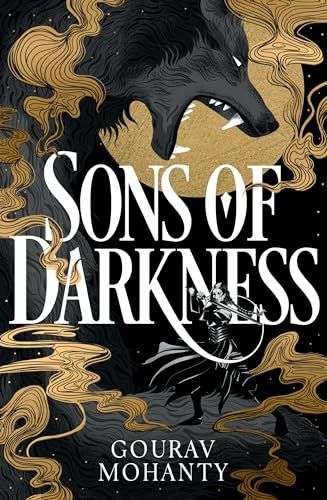Sons of Darkness by Gourav Mohanty
Ad Astra, pb, £10.11
Reviewed by Joely Black

Sons of Darkness is Gourav Mohanty’s debut, inspired by Game of Thrones and the Indian Vedic epic Mahabharata. While SA Chakraborty has done excellent work with their series set in a re-imagined North African world, Mohanty felt that India didn’t have a modern equivalent to the grimdark epic fantasies of the West. Inspired by The Song of Ice and Fire (George R R Martin) and The First Law (Joe Abercrombe), he set out to solve that problem.
This is where I have to say I very much wanted to like this book. The First Law series is a standout favourite, and Glokta remains one of the most memorable characters in my head. I am fully here for Indian—or indeed any other non-Western—take on grimdark fantasy. But I struggled with it. Really, really struggled.
The book opens incredibly well, although this is the first time since an R A Salvatore Drizzt novel that I’ve seen a prologue go on quite so long. The characters in this opening section are well-developed, and the prose, while not the best I’ve ever read, is good. I’m happy doing the extra work required of an SFF reader to discover what’s going on, what the rules of this world might be, and what matters to the characters. I’m here for a Dramatis Personae and a map page every day of the week.
The prologue is divided into several parts. That’s a lot for a prologue, but okay. It’s actually a fascinating story in and of itself; the characters have a great dynamic, even if there’s a lot of them and a lot going on. I’m even happy to jump away from those characters into the main body of the book and to have no immediate sense of how the main story and the prologue tie together. The next section is rather shorter, describing in lurid detail the torture of a child in order to draw out a prophecy. It’s told from Masha’s perspective, and I desperately wanted to know more about her and what she did with her life. Alas, her section is cut short, and we dive into the political world of the empires of a re-imagined Vedic India.
The book does this a great deal. The next section is seen from the perspective of Krishna, defending his republic from an empire, and the tricks he has pulled, Loki-like, in order to defend what he controls. This is good, but during this section, Mohanty’s prose and command of the characters and scene tension begin to slip. I can understand an author of such a dark fantasy wanting to insert comedic moments, but they don’t hit right. As the book progresses, it’s clear there are scenes intended to provide specific emotional moments, but they miss their mark. I’m confused as a reader. It becomes confusing and hard to follow what’s happening, who I might root for and why.
Many scenes lack the solid emotional control Mohanty displayed in the prologue. Characters apparently do not take deadly events seriously, so it’s hard, as a reader, to know what we should treat as devastating and what’s just a joke. On top of that, my inner line editor began to interject over and over. I’m used to reading proofs, but I’m sure this late in the day, somebody surely should’ve stepped in to check the tense agreements, the comma splices, and the basic punctuation.
Finally, and most damningly, Mohanty eventually falls victim to every author’s struggle: telling and not showing. There’s so much telling that scenes lose their emotional energy and quickly end up baggy or just confusing. We’re given so much information and told so much that it’s impossible to follow the real emotional and political action.
The setup is fantastic. It is fantastic to see work being produced that sees the world from the Indian perspective, where Greeks are weird outsiders (yes, I did notice that). We need more of this idea. But this needs better execution. After an excellent start, much of the rest of the book feels like a first draft that needs more attention to manage the dramatic and emotional tension. There is a great deal of potential here, and I very much hope to see more of this kind of work out there in the future, but in a more polished format.
